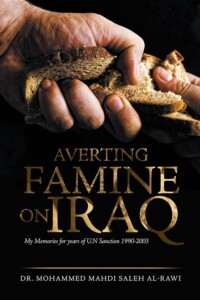Title: Averting Famine on Iraq: My Memories for Years of U.N. Sanction 1990-2003
Author: Dr. Mohammed Mahdi Saleh Al-Rawi
Publisher: XlibrisUS
ISBN: 978-1-6698-5781-5
Pages: 348
Genre: Non-Fiction
Reviewed By: Susan Brown
Pacific Book Review
Famine, the scarcity of food, is a frightening scenario for anyone facing this life-threatening situation. Often caused by drought or mismanagement of resources, Averting Famine on Iraq: My Memories for Years of U.N. Sanction 1990-2003, by author Dr. Mohammed Mahdi Saleh Al-Rawi, instead exposes how sanctions against the government of Iraq created the potential for famine, and how the author’s efforts helped avert it.
From 1990 to 2003, Dr. Saleh worked tenaciously to secure food for the people of Iraq, under enormously difficult conditions, a siege imposed against the country in an effort to “deprive Saddam Hussein of oil revenues worth $150 billion to prevent him from developing weapons of mass destruction.” This book is Dr. Saleh’s story, a story played out on an international stage with countries throughout the world, as both protagonists and antagonists.
HIs work, overseeing the establishment of one of the most effective food distribution systems ever undertaken, was unparalleled. The framework of his program linked a network of support, both in and out of Iraq, that ensured success. “International experts regard the Iraqi program, which feeds more people than any other ration system in the world is twice the size of World Food Organization programs worldwide operation, as the most efficient in the world,” quoted Torben Due, senior expert at the World Food Organization.
If you’re interested in how world governments, and specifically the United States, dealt with Saddam Hussein’s Iraq during this timeframe, this book is an intense and essential read. The author is meticulous in charting the events from the beginnings of world sanctions through ongoing negotiations with the United Nations, to the specifics of the oil-for-food program and creation of a ration card program. He includes in the appendix supporting documents pertinent to his efforts, and there are photographs of important events scattered throughout.
The treatise is also a timeline of the author’s professional work experience, a curriculum vitae of sorts which charts the various and critical positions he held in the Iraqi government throughout the 13-year-span of the book. Regardless of the position he held, what becomes evident through his account is his focus, always was an unwavering commitment to provide food to the citizens of his country.



Follow Us